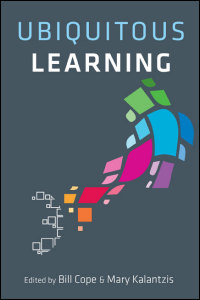
Ubiquitous Learning
edited by Mary Kalantzis and Bill Cope (2010)
I was intrigued by the recent launching of University of Illinois' Ubiquitous Learning Institute (ULI) and its new edited volume by the same name, which includes many contributions from U of I faculty. I've been making my way through the book from both ends - reading the opening overview chapters about ubiquitous learning to get a sense of the main themes, challenges and opportunities associated with this "anywhere, anytime" paradigm, and diving into the final chapters that present ways of rethinking writing and literacy through technology. So far, I've found the discussion on the inherently social dimension of technology very interesting. It has gotten me thinking more about what ubiquitous computing could mean for students' knowledge construction and meaning making in classroom learning. The book has been easy to read and engaging, and I look forward to getting to its middle chapters soon!
edited by Mary Kalantzis and Bill Cope (2010)
I was intrigued by the recent launching of University of Illinois' Ubiquitous Learning Institute (ULI) and its new edited volume by the same name, which includes many contributions from U of I faculty. I've been making my way through the book from both ends - reading the opening overview chapters about ubiquitous learning to get a sense of the main themes, challenges and opportunities associated with this "anywhere, anytime" paradigm, and diving into the final chapters that present ways of rethinking writing and literacy through technology. So far, I've found the discussion on the inherently social dimension of technology very interesting. It has gotten me thinking more about what ubiquitous computing could mean for students' knowledge construction and meaning making in classroom learning. The book has been easy to read and engaging, and I look forward to getting to its middle chapters soon!
 RSS Feed
RSS Feed